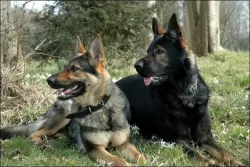 MyDogBreeds
MyDogBreeds Both Kunming Dog and Chinese Shar Pei are originated from China. Kunming Dog may grow 12 cm / 5 inches higher than Chinese Shar Pei. Kunming Dog may weigh 13 kg / 29 pounds more than Chinese Shar Pei. Kunming Dog may live 3 years more than Chinese Shar Pei. Both Kunming Dog and Chinese Shar Pei has almost same litter size. Both Kunming Dog and Chinese Shar Pei requires Moderate maintenance.
Both Kunming Dog and Chinese Shar Pei are originated from China. Kunming Dog may grow 12 cm / 5 inches higher than Chinese Shar Pei. Kunming Dog may weigh 13 kg / 29 pounds more than Chinese Shar Pei. Kunming Dog may live 3 years more than Chinese Shar Pei. Both Kunming Dog and Chinese Shar Pei has almost same litter size. Both Kunming Dog and Chinese Shar Pei requires Moderate maintenance.
 Known also as the Kunming Wolfdog, the Kunming Dog is similar in looks to the German Shepherd Dog, but the coat is recognizably shorter.
Known also as the Kunming Wolfdog, the Kunming Dog is similar in looks to the German Shepherd Dog, but the coat is recognizably shorter.
It’s an attractive looking wolf-like dog which comes from China. It isn’t quite clear which dog breeds were used in the gene pool for these Kunming wolfdogs. You can see though that the German Shepherd as well as other wolfdog-crosses have played a part in the breed's origin.
The dog was created in the early 1950s for military- and guard dog purposes. In 1988, the Chinese Public Security Bureau officially recognized the Kunming Dog as a breed. Today, the dog is still used in military and police services.
 The Chinese Shar-Pei is originally from Canton, China. The Shar-Pei has a blue-black tongue and many deep wrinkles. They have more wrinkles as a puppy than the adult dogs do. They are one of the rarest breeds in the world and are considered a basal breed – meaning their existence predates modern canines. Most canines are related to the gray wolf through genetic admixture. However, there are breeds like the Siberian Husky, the Greenland Dog, Finnish Spitz and the Shar Pei are all related to the Taymyr Wolk of North Asia through admixture. The Shar Pei is found throughout the centuries in Chinese artwork, especially found during the Han Dynasty, and are considered one of the most ancient of breeds on earth today. In this period, they were fighting dogs then became beloved pets. Today the Tibetans still use them as fighting dogs.
The Chinese Shar-Pei is originally from Canton, China. The Shar-Pei has a blue-black tongue and many deep wrinkles. They have more wrinkles as a puppy than the adult dogs do. They are one of the rarest breeds in the world and are considered a basal breed – meaning their existence predates modern canines. Most canines are related to the gray wolf through genetic admixture. However, there are breeds like the Siberian Husky, the Greenland Dog, Finnish Spitz and the Shar Pei are all related to the Taymyr Wolk of North Asia through admixture. The Shar Pei is found throughout the centuries in Chinese artwork, especially found during the Han Dynasty, and are considered one of the most ancient of breeds on earth today. In this period, they were fighting dogs then became beloved pets. Today the Tibetans still use them as fighting dogs.
Following the Communist Revolution, the Char Pei was almost extinct until Margo Law saved the breed. During this time, they smuggled around 200 dogs into the United States. All the dogs in the United States today come from those 200 dogs. They were accepted in 1992 into the AKC. The dogs served as trackers, hunters, ratters, guard dogs and herders.
 The Kunming is a large dog, athletic and muscular, standing at 60 – 68cm and weighing 30 – 38kg. They are dogs which fall under the Spitz type category.
The Kunming is a large dog, athletic and muscular, standing at 60 – 68cm and weighing 30 – 38kg. They are dogs which fall under the Spitz type category.
The dog has a coat which is considered seasonal - double layered in the cooler months and shedding to a shorter coat in the hotter months. The thick coat can be a light tan color to white and he has a black saddle pattern, giving the dog an overall black and tan combination.
The bushy tail is long and its carried down and low except when the dog is excited and alert, then it lifts its tail. The ears are erect like that of the German Shepherd or Wolf.
He isn’t the best breed for a first time owner as he is very strong willed and can tend to become aggressive. It is why he has been used to perform tasks in the military.
These dogs are known for their alertness, and to keep him mentally balanced and amicable, he will need a strong, firm owner who is also fair, patient and consistent. Bored and frustrated, a Kunming can become unpredictable and a first time dog owner might not be able to cope with such an independent, strong-willed, determined, confident dog.
He is also energetic and intelligent, making a great family dog as he is loyal, loving and devoted. His intelligence allows him to learn easily too. Training and socialization will be required if you want him to be obedient.
He is adaptable and can adjust to life in the city or the countryside, but essentially he is better suited to a home with large grounds as he is a dog which is full of energy.
 The Chines Sar Pei has what if known as a Horse-coat which is prickly, harsh, and rough to the touch on one direction and rough to touch on the other. Western Shar Peis can be Horse, Bearcoat and Brush. The Brush is longer and smoother while the Bear coat is rare and in-between the two. The Bearcoat is not accepted by the AKC while the other two types of coats are.
The Chines Sar Pei has what if known as a Horse-coat which is prickly, harsh, and rough to the touch on one direction and rough to touch on the other. Western Shar Peis can be Horse, Bearcoat and Brush. The Brush is longer and smoother while the Bear coat is rare and in-between the two. The Bearcoat is not accepted by the AKC while the other two types of coats are.
The Shar Pei should have a hippo shaped head, a black-purple tongue, black mouth, deep set almond shaped dark eyes, small ears and red coats. His profile is square, and his muzzle is full and wide. Most Shar Peis only have facial and neck wrinkles left as adults.
 Your attractive Kunming dog is an energetic, lively dog who is going to require a good deal of exercise as he was developed to be a working dog.
Your attractive Kunming dog is an energetic, lively dog who is going to require a good deal of exercise as he was developed to be a working dog.
They are loving towards their human families and even well behaved with other dogs in the family. He will however need socialization and training from a firm, fair, consistent owner.
Provide him with a loving environment, lots of exercise, wholesome food, a warm, dry place to sleep and lots of mental and physical stimulation, and you’ll have a wonderful, contended pet and companion.
 The Shar Pei must be socialized early to other people, children and animals if he is to be friendly with them. He is loyal to his people and instinctively wary of strangers. He will be completed devoted to his people, but he is reserved and independent. They can be aggressive and territorial if not socialized. They are stubborn, loving and loyal. They are dominant, brave and playful. They are great watch dogs. Keep them busy because they tend to think a lot independently and if they don’t have a job they may create one.
The Shar Pei must be socialized early to other people, children and animals if he is to be friendly with them. He is loyal to his people and instinctively wary of strangers. He will be completed devoted to his people, but he is reserved and independent. They can be aggressive and territorial if not socialized. They are stubborn, loving and loyal. They are dominant, brave and playful. They are great watch dogs. Keep them busy because they tend to think a lot independently and if they don’t have a job they may create one.
 Your Kunming can reach 12 to 14 years of age if he is loved, fed correctly and adequately exercised. Just as with any dog, he can be susceptible to some of the common dog illnesses. These include the likes of hip dysplasia, bloat, epilepsy, eye problems, ear infections, intestinal parasites, heart disease and skin problems.
Your Kunming can reach 12 to 14 years of age if he is loved, fed correctly and adequately exercised. Just as with any dog, he can be susceptible to some of the common dog illnesses. These include the likes of hip dysplasia, bloat, epilepsy, eye problems, ear infections, intestinal parasites, heart disease and skin problems.
Worms are a chronic problem in dogs and the thing is, they can infect humans too. If you don’t treat worms in your dog, it can lead to your pet becoming seriously ill. You may notice loss of appetite, a dull, thinning coat, anemia and diarrhea.
The vet will be able to offer a treatment that can help with eradicating hook-, round- and tapeworms.
This may sound like a mild dog disease but it can cause a lot of misery for your pet. You’ll notice your pet licking, scratching and biting at raw, red spots on his skin. With bacterial- or yeast infections, your pet can battle with itchiness, pain and discomfort. Luckily your vet can recommend treatments to effectively alleviate symptoms.
 Because of the rushed and inexperienced breeding programs in the United States due to the popularity of the breed, there are many health issues in the North American version of the Shar Pei. Their life expectancy is generally under ten years. They are prone to:
Because of the rushed and inexperienced breeding programs in the United States due to the popularity of the breed, there are many health issues in the North American version of the Shar Pei. Their life expectancy is generally under ten years. They are prone to:
 Grooming for the thick coat should be done regularly. The dog sheds quite a bit and seasonally and you'll want to brush him twice a week to rid the coat of those loose hairs.
Grooming for the thick coat should be done regularly. The dog sheds quite a bit and seasonally and you'll want to brush him twice a week to rid the coat of those loose hairs.
The Kunming Dog is high energy and will therefore suit a family who is active and sporty. He is the kind of dog that you can include in all your activities – walks, hikes, running next to you when you go cycling and swimming.
This is an active dog and you want the best food for him, packed with vitamins and minerals to keep him lively and energetic. Instead of giving him one large meal a day that he gulps down quickly, split his food into 2 smaller meals.
Your dog’s age, his breed and his energy levels will direct you as to how to feed him.
Remember, that although commercially manufactured dog foods need to comply with certain standards, it doesn't guarantee their goodness. It may not be digestible for your pet. If you want to use one of these foods, choose the best there is and try to mix in some wholesome home-made food from time to time.
Cooked chicken, brown rice or pasta and some raw or cooked vegetables can be excellent for him as well as adding in some raw meat occasionally.
 Feed a good quality dry dog food but do not overfeed. You should feed twice a day about one cup per six pounds for puppies. Adults should have two cups a day.
Feed a good quality dry dog food but do not overfeed. You should feed twice a day about one cup per six pounds for puppies. Adults should have two cups a day.
• Familial Shar Pei Fever – congenital and serious. This produces fevers that can last from 24 hours to three days. Swelling around the ankles is due to fluid retention.
• Entropion eye issues – eyelashes curl in and inflame the eye. Can cause blindness if not treated. Requires surgery.
Both as a puppy and an adult this is a pretty active dog. He needs at the very least to be walked every day or have a back yard to play in. They are sensitive to heat so bring them in when its really hot and don’t walk them in the heat. They love to play, are athletic and competitive. Try agility, tracking, rally and obedience trials.